Top Rankings
Luling Independent School District ranks among the top 20% of public school district in Texas for:
Category
Attribute
Graduation Rate
Highest graduation rate (Top 10%)
For the 2025 school year, there is 1 public middle school serving 302 students in Luling Independent School District. This district's average middle testing ranking is 3/10, which is in the bottom 50% of public middle schools in Texas.
Public Middle School in Luling Independent School District have an average math proficiency score of 27% (versus the Texas public middle school average of 40%), and reading proficiency score of 40% (versus the 52% statewide average).
Minority enrollment is 78% of the student body (majority Hispanic), which is more than the Texas public middle school average of 75% (majority Hispanic).
Overview
This School District
This State (TX)
# Schools
3 Schools
2,747 Schools
# Students
1,426 Students
1,489,538 Students
# Teachers
103 Teachers
103,135 Teachers
Student : Teacher Ratio
14:1
14:1
District Rank
Luling Independent School District, which is ranked #965 of all 1,196 school districts in Texas (based off of combined math and reading proficiency testing data) for the 2021-2022 school year.
The school district's graduation rate of 95% has increased from 90-94% over five school years.
Overall District Rank
#974 out of 1204 school districts
(Bottom 50%)
(Bottom 50%)
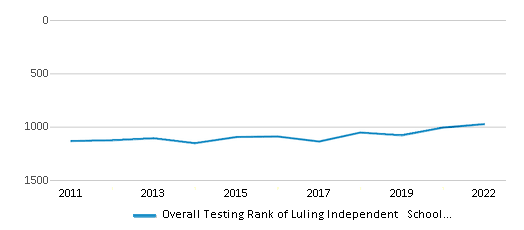
Math Test Scores (% Proficient)
29%
41%
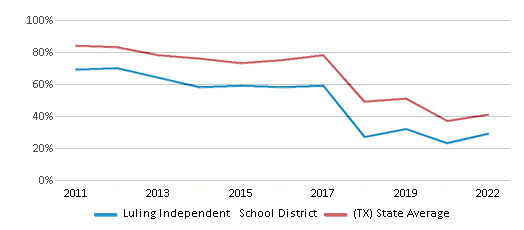
Reading/Language Arts Test Scores (% Proficient)
39%
51%
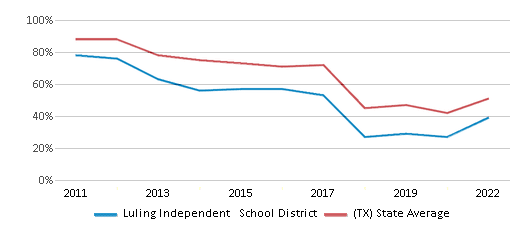
Science Test Scores (% Proficient)
34%
46%
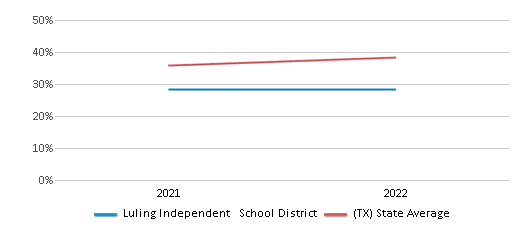
Graduation Rate
≥95%
90%
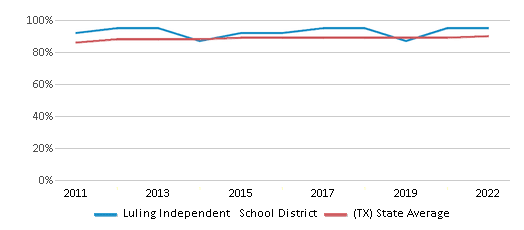
Students by Ethnicity:
Diversity Score
0.49
0.64
# American Indian Students
1 Student
5,199 Students
% American Indian Students
n/a
n/a
# Asian Students
4 Students
77,599 Students
% Asian Students
n/a
5%
# Hispanic Students
959 Students
795,444 Students
% Hispanic Students
67%
53%
# Black Students
88 Students
186,072 Students
% Black Students
6%
13%
# White Students
335 Students
378,957 Students
% White Students
24%
26%
# Hawaiian Students
4 Students
2,404 Students
% Hawaiian Students
n/a
n/a
# Two or more races Students
35 Students
43,863 Students
% of Two or more races Students
3%
3%
Students by Grade:
# Students in PK Grade:
80
15,212
# Students in K Grade:
107
21,462
# Students in 1st Grade:
93
22,752
# Students in 2nd Grade:
109
22,958
# Students in 3rd Grade:
107
22,862
# Students in 4th Grade:
125
22,563
# Students in 5th Grade:
90
30,190
# Students in 6th Grade:
96
326,610
# Students in 7th Grade:
106
406,424
# Students in 8th Grade:
100
414,179
# Students in 9th Grade:
135
56,165
# Students in 10th Grade:
97
48,628
# Students in 11th Grade:
90
42,213
# Students in 12th Grade:
91
37,320
# Ungraded Students:
-
-
District Revenue and Spending
The revenue/student of $12,731 in this school district is less than the state median of $13,387. The school district revenue/student has stayed relatively flat over four school years.
The school district's spending/student of $22,987 is higher than the state median of $14,116. The school district spending/student has stayed relatively flat over four school years.
Total Revenue
$18 MM
$74,029 MM
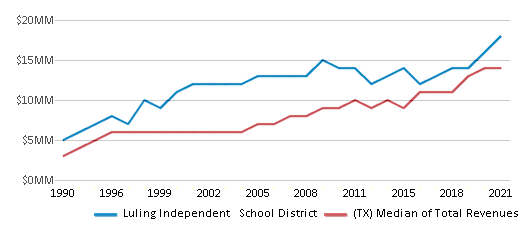
Spending
$33 MM
$78,063 MM
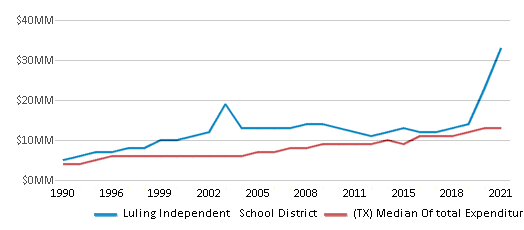
Revenue / Student
$12,731
$13,387
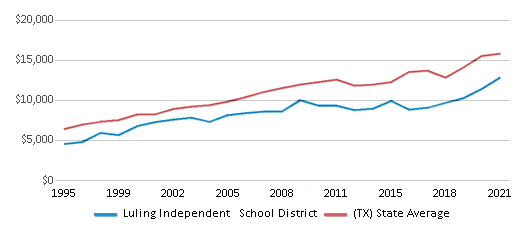
Spending / Student
$22,987
$14,116
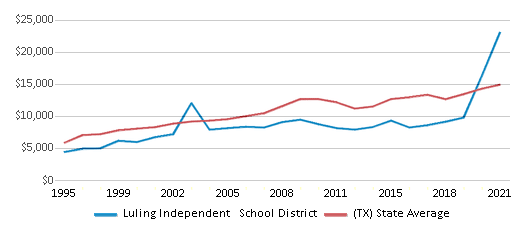
Best Luling Independent School District Public Middle Schools (2025)
School
(Math and Reading Proficiency)
(Math and Reading Proficiency)
Location
Grades
Students
Rank: #11.
Gilbert Gerdes J High School
(Math: 27% | Reading: 40%)
Rank:
Rank:
3/
Bottom 50%10
214 E Bowie St
Luling, TX 78648
(830) 875-2121
Luling, TX 78648
(830) 875-2121
Grades: 6-8
| 302 students
Recent Articles

Sexual Harassment at Age 6: The Tale of a First Grade Suspension
A six-year old in Aurora, Colorado, was suspended after singing an LMFAO song to a little girl in his class and reportedly “shaking his booty.” We look at the case and the sexual harassment problem in public schools today.

How Scaffolding Could Change the Way Your Child Learns
This article explores the concept of instructional scaffolding, a teaching method that enhances learning by breaking down complex tasks into manageable parts. It highlights how scaffolding supports students in developing critical thinking skills and becoming more independent learners. The article discusses the benefits of scaffolding, including improved engagement and reduced anxiety, and provides strategies for its implementation across various educational levels.

February 05, 2025
Understanding the U.S. Department of Education: Structure, Impact, and EvolutionWe explore how the Department of Education shapes American education, from its cabinet-level leadership to its impact on millions of students, written for general audiences seeking clarity on this vital institution.





